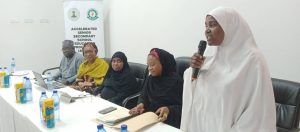FG’s ASSEP Implementation Team Conducts Engagement Visit in Bauchi

By Idris Ayinde
The Implementation Team of the Federal Government and the North East Development Commission’s Accelerated Senior Secondary Education Programme (ASSEP) has conducted an engagement function in Bauchi State.
The programme which was launched by Vice President Senator Kashim Shettima on May 18 this year, ASSEP focuses on Science, Technology, Engineering, Mathematics, and Agriculture (STEMA) to drive future development and human empowerment to dribey education outcomes in North Eastern states.
Dr. Mariam Masha, Senior Special Assistant to the President on Regional Developments Programmes, led the Project Implementation Team (PIT) on an assessment tour to Bauchi State schools and convened an engagement session with critical actors in the education sector of Bauchi State.
Schools visited during the first day of the 2-day assessment visit to the state include Government Girls, Bauchi, Government Girls Day Secondary School Kofar-Wambai, and Sa’adu Zungur Model School, all within the Bauchi metropolis.
The team inspected science laboratories and ICT centers and interacted with teachers enrolled in the black belt teacher training component of ASSEP.
The project implementation team also visited the NEDC ICT Centre located at the Tatari Ali Polytechnic which is expected to serve as one of the centres to train prospecting candidates for the computer-based tests of JAMB.
Speaking during ASSEP state level engagement meeting with stakeholders on Wednesday, Dr Masha commended the stakeholders for their efforts.
“With ASSEP, Nigeria’s North East states are poised for educational transformation. The engagement is an integral part of our assessment visit to the North East states.
“We aim to evaluate the programme’s implementation since its launch and gather feedback from stakeholders,” she said.
She explained that ASSEP aligns with President Bola Tinubu’s renewed Hope Agenda, aiming to bridge the education gap in the region.
“By focusing on STEM education, ASSEP prepares students for a technologically driven future, driving economic growth and development.”
Dr. Jamila Dahiru, Bauchi State Commissioner for Education praised ASSEP, saying it will significantly impact teachers and students.
“This programme will mold our educators and pupils, enhancing the quality of education in our state. The programme’s impact is already being felt, with teachers and students benefiting from virtual reality for practical science experience.
“Teacher training and capacity building and curriculum development and review as well as Intensive Coaching and mentorship
“There are also quiz competitions, educational events and skill development and vocational training. “We are committed to providing an enabling environment for ASSEP’s success,” she assured.
The President of All Nigeria Confederation of Principals of Secondary Schools (ANCOPSS) in Bauchi State, Mr. Rabiu Shehu also commended ASSEP’s positive results, advocating for sustainability and extension to other schools.
“ASSEP has yielded impressive outcomes in terms of learning. We must ensure its continuity and expansion to benefit more students,” he noted.
The engagement session, brings together stakeholders in the education sector and relevant partners to discuss ASSEP’s progress and future plans.
ASSEP is part of Federal Government efforts through the North East Development Commission (NEDC) to transform vital education outcomes in the North East States of Adamawa, Bauchi, Borno, Gombe Taraba and Yobe in line with President Bola Tinubu’s renewed hope Agenda.
The programme’s focus is pragmatic and covers Science, Technology, Engineering, Mathematics and Agriculture (STEMA); subjects that form the foundations of modern economic productivity in any country that aspires to develop.
By intent, ASSEP goes beyond just schooling. It’s about total education, focusing on multiple aspects of an individual’s human capital (social, intellectual, psychological and emotional development).
ASSEP seeks to drive future development and human empowerment in Nigeria’s North East.
============